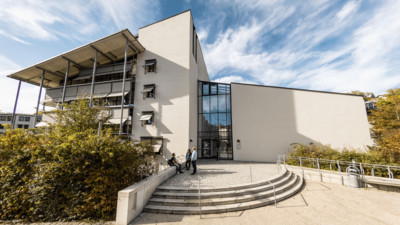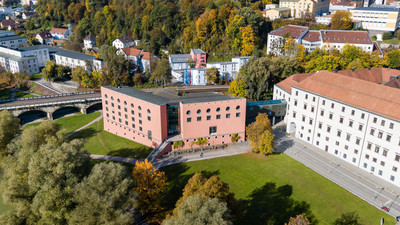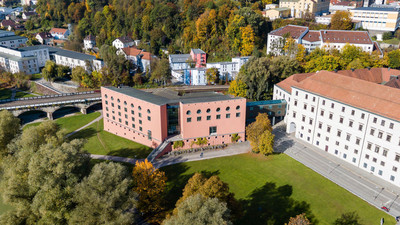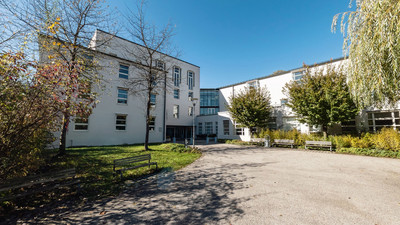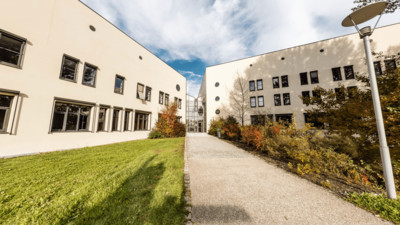His plans for his next trip had been ready for a long while: an excursion with students from the University of Passau over Whitsun, or more specifically, a sailing trip on the 20-metre two-masted schooner Samyrah built from fine woods near Venice and licensed as a training vessel. Launching from the small German port town of Eckernförde, it was to be an eight-day trip through the "Danish South Sea" with its picturesque islands to learn more about sustainability and environmental protection in the Baltic Sea. Even the motto had already been decided on: "Only by grasping can you comprehend, and only those who comprehend know where to grasp."
Malte Steinbrink suddenly and unexpectedly passed away on 4th May. Why write about an excursion that won't be taking place now? Because how he planned the sailing trip reveals so much about the enthusiasm and drive with which Malte Steinbrink pursued science, and because it shows what was important to him for his teaching and in life.
Reading the handout for the planned sailing trip, it is easy to feel his excitement. He wanted to turn the Samyrah into a sailing lecture theatre, to inspire his students for the beauty of the North and the diverse subject areas of geography – and not only as a professor but as a passionate sailor and ardent conciliator between the Global North and South.
As always, for him this trip was about discussing ideas as equals, gaining knowledge through lived experience and direct observation, getting one's hands dirty and last but not least, enjoying an adventure and having a great time with the people around him.
Malte Steinbrink didn't merely believe in the Humboldtian ideal of unity of research and teaching; he embodied it. Getting students who attended his courses and excursions excited about research was a major concern of his from the very start of his university career. His courses often developed into creative, research-based teaching projects in which scientific curiosity and empirical research were tested and cultivated, sometimes using unorthodox topics. For instance, this could involve collecting and analysing data on the prevalence of garden gnomes in allotment gardens in the town of Osnabrück, or exploring ghost towns in northern Italy. Thanks to his affable, unpretentious manner, humour and energy, he captivated his students and motivated them for achievements that many would not have thought themselves capable of. It comes as no surprise that his research-based teaching projects often resulted in published scientific research.
Malte Steinbrink's research on social and cultural geography was focused on urban and regional development processes as well as on phenomena of migration and tourism, which he examined against the background of globalisation. His research spanned numerous countries of the Global South, particularly in Sub-Saharan Africa. He loved travelling, field research and talking to people. In doing so, he pursued the goal of advancing an empirically supported discussion of theory while at the same time ensuring its practical relevance. Core aspects of his research were translocality, mobility, networks and inequality. Last but not least, network analysis and bibliometric science research was another of his focus areas.
At first it didn't look like Malte Steinbrink would ever see the inside of a university, let alone become a professor. Due to a miscalculation in his due date, he spent the first two weeks of his life in an intensive care unit of a hospital in Kiel. Fears that he might have suffered permanent damage lingered for several years.
As it turned out, Malte Steinbrink really wasn't very good at school. Reflecting on his first three years of school, he once said that he had three basic problem areas: reading, writing and arithmetic. This certainly didn't bode well for his schooling and led him to treat anything even remotely connected to education as unimportant. After graduating from the vocational-track Realschule school, it was only with great strain and effort that he made the transition to Gymnasium, which qualifies pupils for university education in Germany. But it wasn't until he entered tertiary education that he began to find joy and fulfilment in learning and research – first at the University of Kassel and later at the University of Osnabrück, where he trained as a geographer. The freedoms offered by the university system and the open discussions between students and lecturers sparked his interest in knowledge generation as well as, ultimately, his ambition to pursue a career in academia.
Malte Steinbrink always held himself and his students to a high standard and would not go easy on himself or others around him. Procrastination was not his style. When an idea came to him for a project, publication or funding application, he had to share it with others, preferably immediately. "Join me for a smoke?" was his standard conversational prompt in such situations – and what followed this ostensible question in terms of elaboration was, as a rule, brilliant and rousing.
Malte Steinbrink was not discouraged by setbacks and defeats. One could say that – like a sailing yacht with a ballast keel – he too had a low centre of gravity and a high righting moment: capsizing was virtually impossible, even in rough seas. He was also fortunate always to have a safe haven within reach, in his wife and son. And from there, he was drawn out into the world again and again.
That Malte Steinbrink has already embarked on his last journey fills us with grief. He still had so many plans and ideas. But as colleagues from Bayreuth put it so aptly when they learnt of his passing: "A geographer is never really gone, he's usually just somewhere else. And what remains is much more than footprints in the sand."
Godspeed, dear Malte!
Book of condolence
A book of condolence has been opened in the offices of the Faculty of Social and Educational Sciences. Due to high demand, the book will remain open until 23rd June inclusive. All those who wish to write a message are invited to go to room NK 224a/222 in the Nikolakloster Building during the office hours (weekdays from 9 a.m. to 12 noon or by appointment).
Commemoration
The University of Passau invites you to the academic memorial service for Professor Malte Steinbrink. This will take place at 5 p.m. on Friday, 23rd June 2023 in the Audimax Building of the University of Passau. Please register by 14th June.

